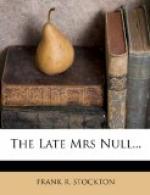CHAPTER XI.
In the little dining-room of the cottage at the Green Sulphur Springs sat that evening Lawrence Croft, a perturbed and angry, but a resolute man. He had been quite a long time coming to the conclusion to propose to Roberta March, and now that he had made up his mind to do so, even in spite of certain convictions, it naturally aroused his indignation to find himself suddenly stopped short by such an insignificant person as Mr Brandon, a gentleman to whom, in this affair, he had given no consideration whatever. The fact that the lady wished to see him added much to his annoyance and discomfiture. He had no idea what reason she had for desiring an interview with him, but, whatever she should say to him, he intended to follow by a declaration of his sentiments. He had not the slightest notion in the world of giving up the prosecution of his suit; but, having been requested not to come to Midbranch, what was he to do? He might write to Miss March, but that would not suit him. In a matter like this he would wish to adapt his words and his manner to the moods and disposition of the lady, and he could not do this in a letter. When he wooed a woman, he must see her and speak to her. To any clandestine approach, any whispered conversation beneath her window, he would give no thought. Having been asked by the master of the house not to go there, he would not go; but he would see her, and tell his love. And, more than that, he would win her.
That morning, while waiting for the time to approach when it would be proper for him to go to Midbranch, he had been reading in a bound volume of an old English magazine, which was one of the five books the cottage possessed, an account of a battle which had interested him very much. The commander of one army had massed his forces along and below the crest of a line of low hills, the extreme right of his line being occupied by a strong force of cavalry. The army opposed to him was much stronger than his own, and it was not long before the battle began to go very much against him. His positions on the left were carried by the combined charge of the larger portion of the enemy’s forces, and, in spite of a vigorous resistance, his lines were forced back, down the hill, and into the valley. It was quite evident he could make no stand, and was badly beaten. Thereupon, he sent orders to his generals on the left to retreat, in as good order as possible, across a small river in their rear. While this movement was in progress, and the enemy was making the greatest efforts to prevent it, the commander put himself at the head of his cavalry and led them swiftly from the scene of battle. He took them diagonally over the crest of the hill, down the other side, and then charging with this fresh body of horse upon the rear and camp of the enemy, he swiftly captured the general-in-chief, his staff, and the Minister of War, who had come down to see how things were going on. With these important prisoners he dashed away, leaving the acephalous enemy to capture his broken columns if he could.




